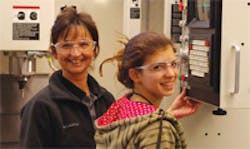Being a female in the maledominated machining trade wasn’t easy for Debra Mann. She asked a lot of questions, and some of the guys she worked with didn’t believe she belonged in their “territory.” But Mann endured the sarcastic remarks and persevered.
She has been the director of the Machining Technology program at Front Range Community College’s Larimer, Colorado, campus for the past 13 years.
Back in the 1980s, Mann ran her own cosmetology business, but she had a tough time making ends meet. So she took some career planning classes to see if there was a better way to support herself and her two sons.
When she found out what machinists actually did, she was amazed and saw that making things out of metal was just as much an art as working with hair and nails. And the benefits and job stability weren’t too bad either.
Mann got her associates degree in machining at Front Range, spent seven years happily employed in a mold shop, then decided to go back to school. She attended Colorado State University where she earned a bachelors degree in Technology Education. After graduating, she earned a job teaching at Front Range and progressed to her present director’s position.
One of the problems Mann faces today is getting her students to stay in school to finish their degree programs. As there is elsewhere, Colorado has a shortage of qualified machinists, and students out of high school have little difficulty in finding work if they have just a bit of training.
While wellmeaning employers may encourage young employees to continue their education nights and weekends, those same employers offer so much overtime that it is tough for a young employee to stay with a formal education.
These short-term rewards are appealing, but not completing a degree can hinder long-term career advancement.
In addition to teaching at the college level, Mann teaches a local high school program that allows students to leapfrog the introductory courses when they get to Community College. She is also an advisory member of the Mastercam (www.mastercam.com) Certification Committee for the Educational Division in Gig Harbor, Wash. The committee is CAD/CAM software developers who are creating a new curriculum that will allow highschool students to learn about CNC equipment and basic CAM programming in realistic on-line computer-simulated manufacturing environments.
Mann said she is excited about this new type of learning because she realizes that fluctuating enrollment levels at the high school could jeopardize the availability of traditional classroom training in machining. On-line machining education will ensure that anyone who is interested in pursuing this career can acquire solid grounding in CNC machining basics before entering her community college program.
According to Mann, students who do well in the computersimulated training are better prepared to take the test that could qualify them to be certified Mastercam programmers. While this certification is not essential in getting a job, it gives employers a much higher level of confidence when hiring the student knowing that he or she is well prepared. Mann speaks with some authority on this subject since she’s taken extensive training that qualifies her to certify Mastercam programmers.
Today, when Mann stands in front of her machining classes, she typically is not the only woman in the room. There are usually one or two young women in the group, and Mann believes that machining is a good career for them and that they, in turn, have something special to offer the industry.
“Women typically pay more attention to directions and are more open-minded. Some men in this business tend to believe it’s their field and they know everything while the women who enroll in this program seem to be on task and meticulous,” Mann said.
Women from Mann’s class are excelling and going on to promising careers in manufacturing. One such woman went on to take over her grandfather’s business.
